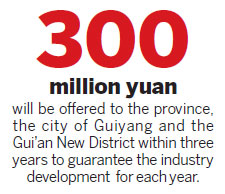Look ahead to the upcoming meetings of the nation's top decision-makers, Zhongguancun Science Park is hosting an event to promote the development of the big data industry together with the southwestern province of Guizhou.
Opening today, the Promotion Conference for Guizhou-Beijing Big Data Industry Development today aims to inform officials, experts and entrepreneurs about the opportunities for big data in Guizhou, which is often overlooked as a less-developed region, organizers said.
Big data is the term for a collection of data sets so large and complex that it becomes difficult to process using on-hand database management tools or traditional data-processing applications. The challenges include capture, curation, storage, search, sharing, transfer, analysis and visualization.
Guizhou hopes to show investors that it has the commitment and resources to realize the potential of the big data industry.
Hailed by some as the "fourth industrial revolution", the big data industry gives Guizhou an edge in economic development.
The province is supplementing State Council's preferential policies for the information technology industry with some of its own.
The Chinese cabinet approved the establishment of new zones in Guizhou early this year in its the latest effort to open up the inland regions. Shortly thereafter, the State Council approved Guizhou's Gui'an New District, and the National Development and Reform Commission issued the overall plan for it on Feb 19.
Covering a total area of 1,795 square kilometers and home to 730,000 people, the district is located at the juncture of Guiyang and Anshun. The new area is intended to reform the industrial structure by boosting institutional innovation.
According to the overall plan, the district will have five functional zones, including an inland open economic platform, an innovative development pilot area, a high-end service accumulation area, an international recreational resort and an ecological civilization leading area.
The district will complete major frame construction and a relative service system by 2015, along with the first phase of the inland open-ended economic system. Up till then, the permanent resident population and output ratio per unit area will catch up with the average of Guiyang.

Construction of an inland open-ended economic system and modern industrial system will be achieved by 2020, and it will transform the district into an international ecologically friendly city.
To accelerate the development of big data industry, the provincial government explicitly announced on Feb 24 that starting this year, the province, the city of Guiyang and the Gui'an new district will respectively allocate no less than 100 million yuan ($16.4 million) annually for three consecutive years.
The government also indicated at the 25th executive meeting of the provincial people's government that Guizhou plans to complete the leading big data resource center and model service base by 2017 using the funds.
"The big data projects offer Guizhou opportunities to catch up with developed regions," said Chen Min'er, provincial governor, while stressing the importance of platform construction, investment attraction, market cultivation and talent support for the big data industry.
At a start-up phase for developing big data industry, the fund of 300 million yuan within three years guarantees its further rapid growth for each year. Besides, the government will provide support in land and fiscal preferential policies to attract leading enterprises.
Meanwhile, the building of a talent resources platform also plays a crucial role for sustaining development. Thus, the government is utilizing the most preferential policies to attract investors or entrepreneurs and then to retain talents.
Contact the writers at [email protected] and [email protected]








